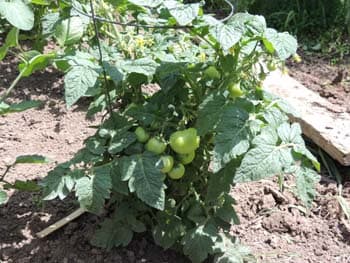How to Control Tomato Hornworms

Tomato Garden Hornworms are a Serious Garden Insect Pest
Tomato Hornworms are serious garden insect pests. These insects are native to the Northern U.S., it is similar to but different than the Tobacco Hornworm. In the larval, or caterpillar stage of growth, this insect has a voracious appetite. Their favorite foods are the leaves of your garden plants. They feed on members of the Nightshade or Solanaceae family. This includes eggplants, peppers, potatoes, and tomatoes.
In the adult stage, the tomato hornworm is a moth. It is known by three names: Hawk-moth, Sphinx moth, or the Hummingbird moth.
Botanical Name: Manduca Quinquemaculata
Identifying Tomato Hornworms
In the larval stage this green grub, or caterpillar, grows up to four inches long. It has white “V” shaped stripes down its sides, with a black horn on its rear. If you see one, you will know, as it is probably the biggest caterpillar you have ever seen. Hornworms have a green color, which is hard to spot, blending in with plant foliage.
They can also be identified, by large black droppings, called frass, found around the base of affected plants.
Life Cycle of Tomato Hornworms
There are usually two generations of Hornworms per year. One generation overwinters, while the second goes through its life cycle much more quickly in the summer months.
In the fall, the moth burrows into the soil and pupates. These dark brown pupae overwinter in the soil. They emerge in the spring. It lays eggs on top and underneath leaves. The eggs hatch in just 4-8 days and the tomato hornworm (caterpillar) emerges.
They grow to full size over 4 weeks. Its main diet is the leaves, stems, and even unripe fruit of tomatoes, eggplants, peppers, and potatoes.
Tomato Hornworm Organic Control
Control methods include:
Hand-picking the bugs off the plants.
Tilling soil in late fall and early spring disrupts the pupae.
Borage plants deter hornworms. Plant these companion plants around a tomato plant.
Ladybugs and lacewings eat eggs.
Paper wasps kill hornworms
Related Articles
Plant Problems – causes and cures
Insect Control – How to identify and control a variety of garden insect pests
Please support our site. Shop for:
- rmmatthews100@hotmail.com
- 585-721-6528
- Rochester, NY
©1999-2024 GardenersNet.Com, All Rights Reserved

